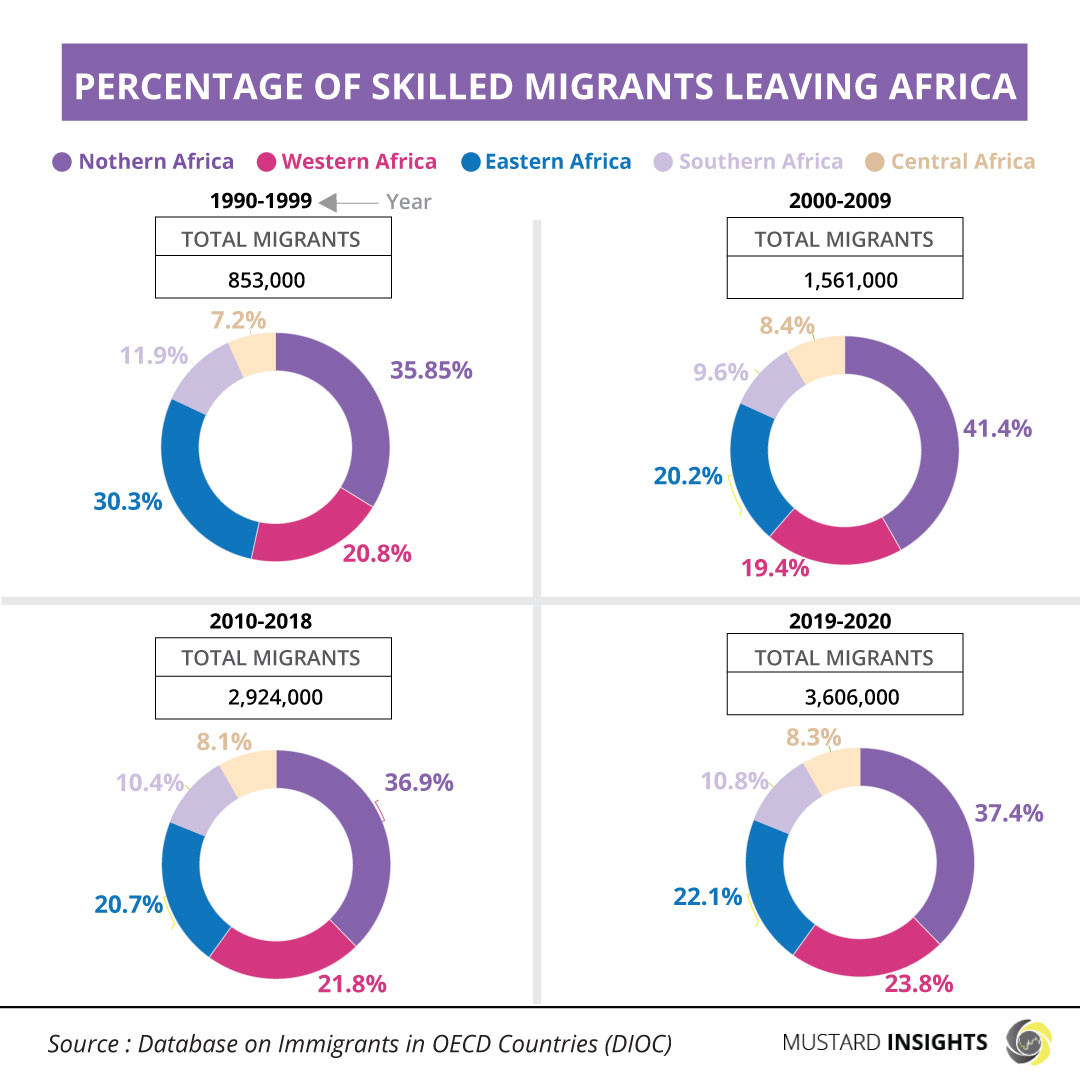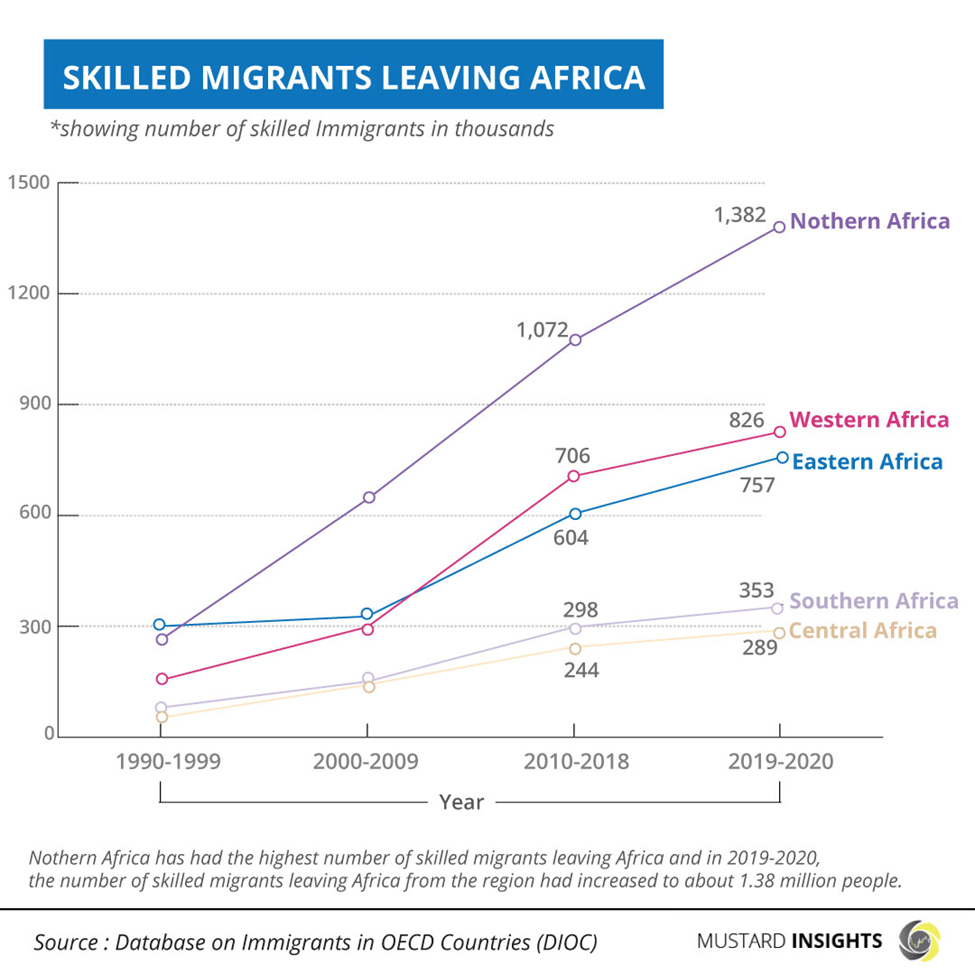Africa’s Brian Drain Intensifies As Skilled Workforce Leave for Global North
Nigeria, Egypt, Ghana, Uganda, South Africa, Kenya and other African countries are seeing its young population to North America, Europe, and Australia (global north).

Africa is losing a significant section of its young population abroad. The young population are increasingly losing confidence in their own countries and the continent as a whole to meet their aspirations. In a recent survey conducted by BBC, more than 4,500 young people in Africa, aged 18-24, are likely to consider emigrating in the next few years, citing economic hardship and education opportunities as the top reasons
According to the Higher Education Statistics Agency (HESA), in Nigeria (Africa's biggest economy), students enrolling in United Kingdom universities rose 64% between 2019/2020 and 2020/2021. This is just a fraction of the overall number of students leaving the country for overseas study. Other African countries such as Egypt, Ghana, Uganda, South Africa, and Kenya also saw many students move to the United Kingdom.
In 2020, the most recent year with statistics on record, Nigeria ranked third behind India and the United States of America as countries whose citizens were invited to apply for Canadian permanent residence. A lot of Africans also emigrate to the United States, Australia, and the European Union (EU), with North Africans particularly preferring the EU.
The figures above show a significant loss of young talent, a “brain drain” away from the continent. The reason that term can be applied is that majority of the migrants were either employed or departing to advance their academic aspirations in these countries. Most of the migrants have the resources to relocate, either through present jobs or family support.
So why are young, educated Africans leaving the continent in droves?

Why Young Africans are leaving
Forty three (43) African countries are performing worse than the global average for human flight and brain drain according to the World Bank and Fund for Peace data. There are a number of factors that may contribute to young Africans departing the continent in hopes of a better life abroad. For example, the spate of rising insecurity, economic stagnation, inequality, labour market imbalances and unemployment are some predominant drivers.
It is no secret that a lot of the African continent continues to grapple with issues of insecurity. In sub-Saharan Africa, several countries are either at war outright (Cameroon, Ethiopia, Somalia, the Central African Republic) or dealing with sustained and rising insurgencies (Nigeria, Burkina Faso, Mali, Chad). In some of these countries, these conflicts have carried on for more than a decade.
In addition, there is correlation between conflict and economic stagnation. War and conflict don’t just cause insecurity; they also have severe economic costs including damage to infrastructure, national debt increase, inflation, slowdown in foreign investment and a decline in the working population.
Inflation and national debt also contribute in terms of loss of jobs and a rise in unemployment. There is proof in the fact that nine of the fifteen worst-ranked countries in the continent in terms of insecurity are also among the worst in terms of economic decline.
Inequality also contributes to brain drain because a lot of young people may not see an opportunity to climb up the economic ladder in their home countries. Africa has high rates of inequality, with 46 countries scoring above the World Bank global average, and 14 of the top 20 countries in the world coming from the region.
As noted earlier, most of the people leaving the continent this way tend to have the resources to do so, often being from the middle and upper class of society. The erosion of the middle class inevitably contributes negatively to economic progress and equality, with the workforce left behind being either too old or unskilled.
A Grim future?
Brain drain can have a negative impact on the sending region, such as reduction of human capital, limited capacity to innovate, reduced economic growth, demographic shifts, and a higher cost of public goods.
The only solution to reversing the flow of skilled workforce in Africa is to create the conditions for the average citizen to thrive economically and live in secure society. As such, the future doesn’t look too bright for a lot of African countries, unless the trends are reversed.
Unfortunately, most of the intra-state conflicts show no sign of resolution any time soon, and Africa will bear a sizeable brunt of the global economic decline and ecological crisis. There is enormous work for the respective national governments in Africa to reverse these trends and create policies to boost growth and stimulate development to retain its teeming young population.
Thoughts?
We won't share your email address. All fields are required.
